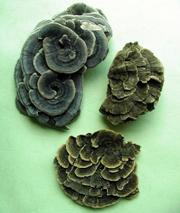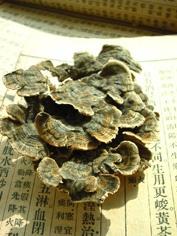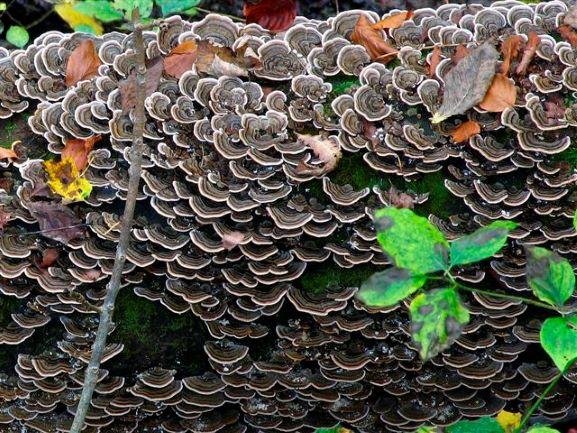.
PSP is classified as a biological response modifier which is capable of modifying the biological response by stimulating the immune system and thereby inducing various therapeutic effects. Extensive pharmacological studies have demonstrated that it exerts anti-tumor and immuno-regulatory activities.
1. Anti-tumor functions
In vitro and in vivo studies reported that PSP possesses selective anti-cancer activity against certain cancer cells. PSP was reported to exert potent anti-carcinogenic effects evidenced by suppression of cell proliferation, gene modulation, cell cycle arrest and induction of apoptosis in different malignant cell lines.
Cell growth and prostate specific antigen production of LNCaP prostate cancer cells
Alcoholic extracts of PSP in 70% ethanol significantly reduced the androgen-dependent human prostate cancer cell LNCaP growth and down-regulated prostate specific antigen (PSA) production. 5
Cell proliferation and cell cycle progression of human HL-60 leukemia cells
An in vitro experiment showed that both 70% ethanol and water extracts of PSP resulted in dose-dependent cell growth suppression in the human promyelocytic HL-60 leukemic cells after 3-day incubation in 0,1,3,5,7.5 and 10 ul/ml of extracts. In addition, incubation of HL-60 cells with either extracts resulted in significant change in the cell cycle distribution through the G 1/S cell cycle arrest. The water extracts exert more potent growth inhibition and apoptotic effect compared to the alcoholic extracts. 6
Control of cell proliferation and cell cycle arrest in human U-937 leukemia cells
Aqueous extracts of PSP inhibited cell proliferation and cell cycle progression and induced apoptosis in human U-937 leukemia cells. At low dose (0.1mg/ml), cell cycle arrest occurred at the G 1/S phases. While at higher concentration (0.5 and 1mg/ml), increase in G 2/M phases of the cell cycle was observed. 7
Induction of apoptosis in HL-60 and U-937 leukemia cells
Treatment with high dose (1mg/ml) of water extracts PSP for three days resulted in the induction of apoptosis in both HL-60 and U-937 human leukemia cells, as shown by the appearance of cells displaying fractional DNA content in flow cytometric analysis and the cleavage of DNA repair enzyme poly (ADP-ribose) polymerase (PARP). 7
Other study demonstrated that PSP induced apoptosis of human promyelocytic leukemia HL-60 cells but not of normal human T-lymphocytes. The apoptotic machinery induced by PSP was associated with a decrease in Bcl-2/Bax ratio, drop in mitochondrial transmembrane potential, cytochrome c release, and activation of caspase-3, -8 & -9. 8
Effect of PSP on the cytotoxicity of cyclophosphamide on HepG2 liver cancer cells
PSP enhanced the cytotoxic effect of cyclophosphamide in HepG2 cells. The combination of cyclophosphamide and PSP (10μM) decreased cell viability by 22% and 10% when compared with cyclophosphamide and PSP alone. 9
Anti-tumor effect in tumor bearing mice models
In vivo anti-tumor activity of PSP has also been extensively studied. Significant tumor size reduction was shown after prolonged administration of PSP in the tumor bearing mice models such as scaroma 180, lung adenocarcinoma and Lewis lung cancer. 10
2. Immunoregulatory Activities
Effects of PSP extracts on secretion of the immunomodulating cytokines
Both water and ethanol extracts of PSP at concentration of 5μl/ml significantly increased the secretion of interleukins, IL-1β and IL -6 in HL-60 leukemia cells after 3-day incubation, with the water extract eliciting a more pronounced change. Production of IL-8 decreased in response to the addition of both extracts of PSP. 6
PSP restored cyclophosphamide-induced immunosuppression in rats
Effects of PSP on cyclophosphamide-induced immunosuppression were investigated by determining lymphocyte proliferation, natural killer cell function, IgG and IL-2 concentration. The results showed that PSP could restore cyclophosphamide-induced immunosuppression in male Wistar rats by stabilizing lymphocyte proliferation, NK cell function, white blood cell count, IgG and IL-2 secretion. 11
Immunomodulative effect of PSP in tumor bearing mice
PSP was found to be able to significantly raise serum half hemolysin concentration (HC50) and to retard the process of thymus atrophy in tumor S180 sarcoma bearing mice. Serum levels of immunological globulin (IgG) and alexin C3 in the mice were also significantly increased. 12
3. Clinical Studies Overview 
Breast Caner
The effect of PSP on peripheral blood counts was evaluated on 11 Chinese breast cancer patients and 13 patients from the historical control were used as the control. Results: Five patients in the treatment group noticed an increase in appetite. 13
Non-small cell Lung Cancer (NSCLC)
The use of PSP in slowing down disease progression in patients with advanced NSCLC was assessed in double-blinded controlled trials in which 68 patients (treatment n=34, placebo n=34) were treated for four weeks. After 28-day treatment, there was a significant improvement in blood leukocyte and neutrophil counts, serum IgG and IgM levels in the treatment group. PSP treatment appeared to be associated with slower deterioration in patients with advanced NSCLC. 14
Gastric Cancer (Adenocarcinoma)
The use of PSP in easing the side effects associated with chemotherapy and radiation in patients with stage I to IV gastric cancer was assessed in double-blinded controlled trials in which 60 patients (treatment n=30, placebo n=30) were treated for two months. PSP is safe and can help lessen the degree of side effects that chemotherapy and radiation produces. It also improved or maintained the immunological profiles of gastric cancer patients. 15
Esophageal Cancer (Squamous cell carcinoma)
The use of PSP in easing the side effects associated with chemotherapy and radiation in patients with stage I to IV esophageal cancer was assessed in double-blinded controlled trials in which 61 patients (treatment n=31, placebo n=30) were treated for two months. PSP is safe and can help lessen the degree of side effects that chemotherapy and radiation produces. It also improved or maintained the immunological profiles of esophagus cancer patients. 15
Hepatitis B
Clinical trial of total 75 patients (male or female) with acute or chronic hepatitis B has demonstrated that PSP treatment, which is assigned to 33 patients, can effectively improve the hepatic functions and shorten the treatment duration if it is used adjunctively with the regular treatment to hepatitis B (1.02g, three times daily). 16
Another clinical study of total 60 subjects (male or female) with chronic hepatitis B has shown that PSP can significantly reduce the Hepatitis B surface Antigen (HBsAg) and the Hepatitis Be Antigen (HBeAg) in bloodstream after 30-day of oral treatment (1.02g, three times daily). 17
4. Herb-Drug Interactions
A clinical study was to investigate the ability of PSP to inhibit or induce the drug metabolism of CYP450 3A 4 in healthy adult human subjects by using a diagnostic CYP450 3A4 specific assay, the erythromycin breath test (EBT). The 14-day course of PSP in 12 healthy subjects (eight women and four men) was not associated with any clinically significant CYP450 3A4 inhibition or induction. This suggests that administration of PSP with other medications and dietary supplements which are primarily metabolized by the CYP450 3A4 pathway is not expected to be associated with significant herb-drug interactions. 18
Toxicology
PSP or PSK have an extremely low level of toxicity. The no-effect dose level after oral administration of PSP to mice was 20g/kg/day. A dose of 1.5g/kg/day PSK in mice for 60 days, which is approximately 130 times of the therapeutic dose in humans, did not cause any toxic effect. PSP has shown no evidence of reproductive toxicity 1
Administration and Dosage
Cloud mushroom in crude form is often used for decoction, 9~27g each time.19
Adverse Effect, Side Effects and Cautions
Not in detail, and no interactions are known.4
References
1.上海科學技術出版社 << 中華本草 >> 1: 527-529 (1999).
2.Au Ming (editor-in-chief), Chinese-English Manual of Common Used in Traditional Chinese Medicine, Publishing House of Guangdong Science & Technology, 1996.
3.http://psp-research.com/yang.htm
4.Natural Medicines Comprehensive Database, compiled by the editors of Prescriber's Letter & Pharmacist's Letter, 4 th edition 2002.
5.Wu, J.M. et al. Cell growth and gene modulatory activities of Yunzhi (Winsor Wunxi) from mushroom Trametes versicolor in androgen-dependent and androgen-insensitive human prostate cancer cells. Int. J. Oncol.18, 81-88 (2001).
6.Wu, J.M. et al. Effects of extracts of Coriolus versicolor (I'm Yunity) on cell-cycle progression and expression of Interleukins-1β, -6, and -8 in promyelocytic HL-60 leukemic cells and mitogenically stimulated and nonstimulated human lymphocytes. J. Altern. Complem. Med.8, 591-602 (2002).
7.Wu, J.M. et al. Induction of cell cycle changes and modulation of apoptogenic/anti-apoptotic and extracellular signaling regulatory protein expression by water extracts of I'm-Yunity (PSP). BMC Complement. Altern. Med.6, In press (2006).
8.Yang X. et al. The cell death process of the anticancer agent polysaccharide-peptide (PSP) in human promyelocytic leukemic HL-60 cells. Oncol. Rep.13, 1201-1210 (2005).
9.Chan, S.L. et al. Effects of polysaccharide peptide (PSP) from Coriolus versicolor on the pharmacokinetics of cyclophosphamide in the rat and cytotoxicity in HepG2 cells. Food Chem. Toxicol. 44, 689-694 (2006).
10.Ng, T.B. A review of research on the protein-bound polysaccharide (polysaccharopeptide, PSP) from the mushroom Coriolus versicolor (Basidiomycetes: Polyporaceae). Gen. Pharmac.30, 1-4 (1998).
11.Qian, Z.M. et al. Polysaccharide peptide (PSP) restores immunosuppression induced by cyclophosphamide in rats. Am. J. Chin. Med.25, 27-35 (1997).
12.Xu, L.Z. et al. Experimental research on the anti-cancer immunomodulative effect of the polysaccharide-peptide of Coriolus versicolor. Chin. J. Canc. Res.1, 7-12 (1989).
13.Shiu, W.C.T. et al. A clinical study of PSP on peripheral blood counts during chemotherapy. Phytother. Res.6, 217-218 (1992).
14.Tsang, K.W. et al. Coriolus versicolor polysaccharide peptide slows progression of advanced non-small cell lung cancer. Resp. Med.97, 618-624 (2003).
15.Kidd, P.M. The use of mushroom glucans and proteoglycans in cancer treatment. Altern. Med. Rev.5, 4-27 (2000).
16.Song Z.H. et al., Clinical study of PSP on chronic hepatitis B. Guangxi Medical Journal. 22, 1424-25 (2000).
17.F.W. Liu et al., Clinical study of PSP on acute or chronic hepatitis B. Zhejiang Integrated Medical Journal. 12, 692 (2002).
18.Nicandro, J.P. et al. In vivo effect of I'm-Yunity TM on hepatic cytochrome P450 3A4. J. Herb. Pharmacother. 7, 39-56 (2007).
19.Chinese Pharmacopoeia Commission, Pharmacopoeia of the People's Republic of China (Volume I), People's Medical Publishing House, 2005.





